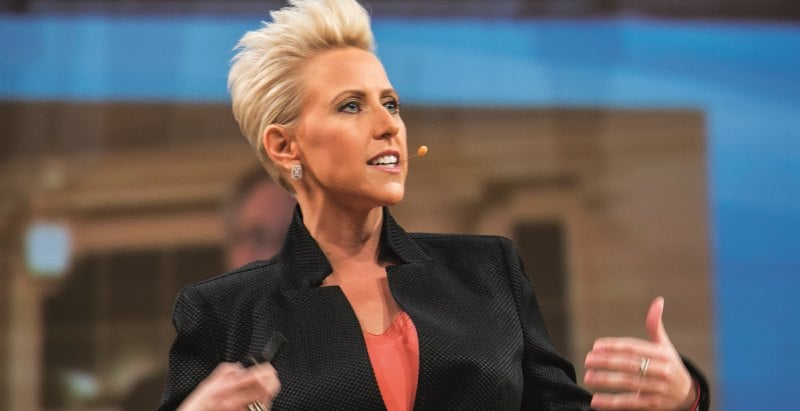Finding the Perfect Fit: Matching Speakers to Your Event
Have you ever attended an event where the keynote speaker left you feeling inspired, motivated, and eager to take action? The right speaker can make all the difference in creating a memorable and impactful event. Whether you’re organizing a conference, seminar, or corporate gathering, finding the perfect fit for your event is essential.
In this article, we will guide you through the process of matching the ideal speaker for your event, ensuring that their expertise, experience, and style align with your goals and objectives. We’ll explore the key factors to consider, from understanding your event’s needs to assessing the speaker’s expertise and message. Let’s dive in and discover how to find the perfect match that will captivate your audience and leave a lasting impression.
“A great speaker can truly transform an event, bringing energy, knowledge, and inspiration to the audience.”
Understanding Your Event’s Needs
When it comes to planning an event, one of the most crucial steps is finding the perfect speaker. But before you start searching for potential candidates, it’s essential to understand your event’s needs. By doing so, you can ensure that the speaker you choose aligns perfectly with your objectives and resonates with your audience.
Here are some key factors to consider when understanding your event’s needs:
Identifying the Goals and Objectives
First and foremost, take the time to clearly define the goals and objectives of your event. What do you hope to achieve? Are you looking to inspire, educate, entertain, or motivate your audience? By identifying these goals, you can narrow down the type of speaker that will best suit your event.
Defining the Target Audience
Understanding your target audience is crucial in selecting the right speaker. Consider their demographics, interests, and needs. Are they professionals in a specific industry? Are they students looking for career guidance? Knowing your audience will help you find a speaker who can relate to them and deliver a message that resonates.
Determining the Theme and Tone
Every event has a theme and tone that sets the overall atmosphere. Is your event formal or informal? Is it focused on innovation, personal development, or social issues? Understanding the theme and tone will help guide your search for a speaker who can align their message with the desired ambiance of your event.
By taking the time to understand your event’s needs, you will be better equipped to find a speaker who can meet those needs and make a lasting impact on your audience. Once you have a clear understanding of your event’s objectives, it’s time to start researching potential speakers.
Researching Potential Speakers
When it comes to matching the perfect speaker for your event, thorough research is essential. You want to ensure that the person you choose is not only knowledgeable and experienced but also aligned with the goals and objectives of your event. Here are some steps to help you in researching potential speakers:
Industry Experts and Thought Leaders
- Look for speakers who are highly regarded and respected in their field. These individuals have built a reputation for their expertise and knowledge.
- Check if they have written books, articles, or have been featured in influential blogs or publications. This can indicate their thought leadership and the quality of insights they can provide.
- Evaluate their online presence, including their website, social media profiles, and online reviews. This can give you a sense of their reputation and how well they engage with their audience.
Relevant Authors and Influencers
- Consider authors who have written books that relate to the theme or purpose of your event. They can bring a unique perspective and insights that are directly relevant to your audience.
- Look for influencers who have a significant following in your industry or target audience. Their ability to connect with and engage a large number of people can add value to your event.
Professional Speakers Associations
- Research professional speakers associations that have a directory of speakers. These associations often have strict membership criteria, ensuring that the speakers listed have a certain level of expertise, professionalism, and experience.
- Explore the association’s website and browse their speaker directory. You can often filter speakers based on criteria such as topic, location, and fee range, making it easier to find speakers that meet your specific needs.
Remember to keep track of potential speakers as you conduct your research. Note down their contact information, key points about their expertise, and any other relevant details that will help you make an informed decision.
Pro Tip: Don’t limit your research to well-known speakers or celebrities. There may be hidden gems in your industry who are not as widely recognized but still have valuable insights to offer.
Taking the time to thoroughly research potential speakers will payoff in finding the perfect fit for your event. It ensures that you choose someone who not only possesses the knowledge and experience you need but also resonates with your audience and enhances the overall success of your event.
Assessing Speaker Expertise and Experience
When it comes to finding the perfect speaker for your event, it’s essential to assess their expertise and experience. You want to ensure that the speaker you choose is not only knowledgeable but also has a track record of delivering impactful presentations. Here are some tips on how to assess a speaker’s expertise and experience:
1. Reviewing Speaker’s Background and Credentials
Before making a decision, take the time to thoroughly review the speaker’s background and credentials. Look for information such as:
- Educational background: Does the speaker have relevant qualifications or certifications in their field?
- Work experience: Has the speaker worked in the industry or field related to your event?
- Awards and recognitions: Has the speaker been recognized for their expertise or achievements in their field?
By reviewing the speaker’s background and credentials, you can get a better understanding of their expertise and whether it aligns with the goals and objectives of your event.
2. Evaluating Past Speaking Engagements
Another important factor to consider is the speaker’s past speaking engagements. Look for information on their previous talks or presentations, and assess the following:
- Topics covered: Are the topics relevant to your event and audience?
- Feedback and testimonials: What do past attendees or event organizers say about the speaker’s presentation style and content?
- Audience engagement: Did the speaker effectively engage the audience and deliver a memorable experience?
Evaluating the speaker’s past speaking engagements will give you insights into their ability to connect with the audience and deliver a compelling presentation.
3. Analyzing the Speaker’s Relevance to Your Event
When assessing a speaker’s expertise and experience, it’s crucial to consider their relevance to your event. Consider the following:
- Knowledge of the topic: Does the speaker have a deep understanding of the subject matter of your event?
- Alignment with event goals: Can the speaker’s expertise contribute to achieving the goals and objectives of your event?
- Industry recognition: Is the speaker considered a thought leader or expert in their field?
Choosing a speaker who is relevant to your event will not only enhance the overall experience but also ensure that the audience receives valuable insights and takeaways.
Remember, assessing a speaker’s expertise and experience is an essential step in finding the perfect fit for your event. By thoroughly reviewing their background and credentials, evaluating their past speaking engagements, and analyzing their relevance to your event, you can make an informed decision that will create a memorable experience for your attendees.
Matching Speakers to Your Event
Once you have narrowed down your list of potential speakers for your event, it’s important to ensure that their style and message align with the purpose and theme of your event. A great speaker can captivate the audience and leave a lasting impression, but only if their style and message resonate with your attendees. Here are some tips for matching a speaker’s style and message to your event:
Listening to Speaker’s Previous Talks or Presentations
One of the best ways to get a sense of a speaker’s style and message is by listening to their previous talks or presentations. Many speakers have recordings or videos available online, which you can use as a reference. By listening to their previous work, you can gauge their speaking style, energy level, and ability to engage an audience. Pay attention to their storytelling abilities, humor, and overall delivery to see if it aligns with the vibe you want to create for your event.
Aligning Speaker’s Message with Your Event’s Purpose
Consider the message that the speaker delivers in their talks. Does it align with the purpose and goals of your event? For example, if your event focuses on entrepreneurship and innovation, you might want to look for a speaker who has experience in those areas and can share insights and practical advice with your attendees. Make sure that the speaker’s message can provide value and relevance to your audience.
Considering Speaker’s Presentation Style
Take into account the speaker’s presentation style and how it will fit in with the overall flow of your event. Are you looking for a high-energy speaker who can kick off the event with an engaging and dynamic presentation? Or do you prefer a more conversational and interactive speaker who can facilitate a panel discussion or workshop? Consider the format of your event and the preferences of your audience to ensure that the speaker’s style is a good fit.
It’s important to remember that the speaker should enhance the event experience and provide value to the attendees. They should be able to inspire, educate, or entertain the audience in a way that aligns with your event’s goals and objectives. By matching the speaker’s style and message to your event, you can create a cohesive and impactful experience for your attendees.
“A great speaker has the ability to connect with an audience and leave a lasting impression. By aligning their style and message with your event, you can create an unforgettable experience for your attendees.”
Budget Considerations
When it comes to selecting the perfect speaker for your event, one of the key factors to consider is your budget. It’s important to set a realistic budget upfront and plan your expenses accordingly. Here are some budget considerations to keep in mind:
Setting a Realistic Budget
Before you start researching potential speakers, it’s crucial to determine how much you are willing to spend on securing a speaker. Consider factors such as the size of your event, the duration of the speaking engagement, and the level of expertise you are looking for. Remember that top-tier speakers may come with a higher price tag, so be prepared to allocate a significant portion of your budget if you have your heart set on a well-known speaker.
Negotiating Speaker Fees
Once you have a shortlist of potential speakers, it’s time to negotiate the speaker fees. Keep in mind that negotiating fees is a common practice in the industry, and many speakers are willing to adjust their rates to fit within your budget. Here are a few tips for successful fee negotiations:
- Highlight the value: Explain to the speaker how their presence at your event will provide value to both the attendees and the speaker themselves. Emphasize the exposure they will receive and any promotional opportunities associated with your event.
- Package deals: If you are considering booking multiple speakers or hiring the speaker for multiple events, discuss the possibility of a package deal. This can sometimes lead to a discounted rate or additional services included.
- Timing: If your event falls during a less busy period for the speaker, you may have more negotiating power. Inquire about their availability and check if they are willing to offer a lower rate for events during their off-peak season.
Considering Additional Expenses
In addition to the speaker’s fee, there may be additional expenses to consider when planning your budget for a speaker. These may include:
- Travel and Accommodation: Depending on the location of your event and the speaker’s place of residence, you may need to cover their travel expenses, accommodation, and meals. Be sure to discuss these details with the speaker during the negotiation process.
- Audiovisual Requirements: Some speakers may have specific audiovisual requirements for their presentations, such as specialized equipment or technical support. Ensure that you account for these potential costs when planning your budget.
- Contractual Obligations: Review the speaker’s contract thoroughly and consider any additional costs or obligations outlined in the agreement. This may include things like providing marketing materials or covering any expenses related to late payments.
Remember, it’s essential to be transparent and communicate your budget constraints with potential speakers from the onset. Honesty and open dialogue can help both parties find a mutually beneficial arrangement.
By being mindful of your budget and exploring negotiation options, you can secure a speaker who fits within your financial parameters while still delivering an impactful and memorable presentation at your event.
Securing the Perfect Speaker
Once you have done your research and identified potential speakers that align with the goals and requirements of your event, it’s time to start the process of securing the perfect speaker. This step is crucial to ensure that you not only find someone who is a great fit for your event, but also that they are available on your chosen date and within your budget.
Contacting Potential Speakers
Reach out to the speakers you have shortlisted and express your interest in having them speak at your event. This can be done via email or a phone call. Be clear and concise about the details of your event, including the date, location, and audience. If possible, provide them with a brief overview of what you are looking for in a speaker and how you believe they would be a great fit.
Sending Detailed Event Information
Once you have received a positive response from a speaker, make sure to provide them with all the necessary information about your event. This includes the theme, the audience demographics, the duration of their speech, and any specific requirements you may have. The more information you provide, the better prepared the speaker will be to tailor their presentation to your event.
Finalizing Contract and Logistics
Once you have agreed on the terms and conditions with the speaker, it’s time to finalize the contract. Make sure you have a written agreement that outlines the speaker’s fee, any additional expenses, and the cancellation policy. This will protect both parties and ensure a smooth working relationship. Additionally, discuss logistics such as travel arrangements, accommodation, and audio-visual requirements to ensure a seamless experience for the speaker on the day of the event.
Remember, communication is key throughout this process. Stay in touch with the speaker and provide any necessary updates or information leading up to the event. By creating a positive and professional relationship, you increase the chances of having a successful and impactful speaker at your event.
“Securing the perfect speaker requires effective communication and organization. Make sure to provide detailed event information and finalize all contract and logistics to ensure a smooth experience for both you and the speaker.”
Evaluating the Speaker’s Performance
Once you’ve successfully secured a speaker for your event and the presentation is over, it’s important to take the time to evaluate the speaker’s performance. Evaluating the speaker’s performance can provide valuable feedback and insights that can help you improve future events and ensure that your attendees receive the best possible experience. Here are some steps you can take to effectively evaluate the speaker’s performance:
- Collecting Attendee Feedback: One of the most valuable sources of information about the speaker’s performance is the feedback from your event attendees. You can collect feedback through surveys, online forms, or by engaging in conversations with attendees. Ask questions about their overall impression of the speaker, their understanding of the content, and whether they found the presentation engaging and informative. Pay attention to any specific comments or suggestions that attendees provide.
- Assessing the Speaker’s Impact: Evaluate how well the speaker’s message resonated with the audience and whether they were able to effectively communicate their ideas. Did the speaker inspire and motivate the attendees? Were the key takeaways clearly presented? Assess the level of engagement and interaction between the speaker and the audience. Consider whether the speaker was able to create a positive and memorable experience for the attendees.
- Measuring Event’s Success: Assess the success of the event by considering different metrics. Did the speaker contribute to achieving the goals and objectives of the event? Evaluate whether the speaker’s presentation helped in conveying the intended message and whether it aligned with the theme and tone of the event. Consider the level of audience participation and whether the speaker’s presentation had a positive impact on the overall attendee experience.
Remember, the evaluation process should be thorough yet constructive. It’s important to provide feedback to the speaker in a respectful manner, focusing on areas of improvement rather than criticism. Providing specific examples and suggestions for improvement can be valuable for both the speaker and your future events.
In addition to evaluating the speaker’s performance, it’s also crucial to review and analyze your own event management and organization. Assess whether the logistics were smooth, the event ran on schedule, and if there were any technical or logistical issues that affected the speaker’s performance. This information can help you improve the overall event execution and create a better experience for attendees and speakers alike.
By evaluating the speaker’s performance and analyzing the event as a whole, you can gather valuable insights and make informed decisions for future events. Continuous improvement is essential in organizing successful events, and the feedback from evaluating the speaker’s performance is an important tool in achieving that goal.
Conclusion
In conclusion, finding the perfect speaker for your event requires careful consideration and research. By understanding your event’s specific needs, researching potential speakers, assessing their expertise and experience, and matching their style and message to your event, you can ensure a successful and impactful presentation.
Remember, it’s important to define the goals and objectives of your event, identify your target audience, and determine the theme and tone you want to set. This will help you narrow down your search for speakers who align with these criteria.
When researching potential speakers, look for industry experts, thought leaders, relevant authors, and influencers who have valuable insights and experiences to share. Don’t forget to explore professional speakers associations, as they often have a roster of qualified speakers.
Assessing a speaker’s expertise and experience is crucial to ensure they can deliver a high-quality presentation. Review their background and credentials, evaluate their past speaking engagements, and analyze their relevance to your event’s topic.
Matching the speaker’s style and message to your event’s purpose is essential for creating a cohesive and engaging experience for your audience. Take the time to listen to their previous talks or presentations, align their message with your event’s goals, and consider their presentation style.
Budget considerations should also be taken into account when selecting a speaker. Set a realistic budget, negotiate speaker fees if necessary, and consider any additional expenses such as travel and accommodation.
Once you have identified your ideal speaker, reach out to them and provide detailed information about your event. Finalize the contract and logistics to secure their participation.
After the event, evaluate the speaker’s performance by collecting attendee feedback, assessing the speaker’s impact, and measuring the overall success of your event. This will help you make informed decisions for future events and ensure continuous improvement.
How to Find and Hire a Speaker
Funny Business Agency has a handpicked, vetted group of event speakers. Visit here or email here.
Funny Business Agency Related Posts



